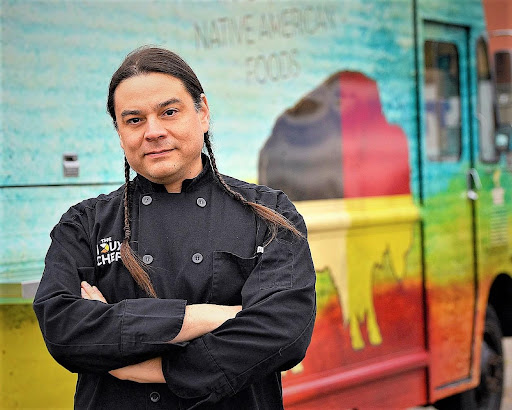
- Details
- By Lakota Food Summit
RAPID CITY, S.D.— The Lakota Food Sovereignty Coalition is set to host its second Lakota Food Summit on February 15, 16, 17, 2022. The summit takes place at the Rushmore Plaza Civic Center-Holiday Inn in Rapid City, South Dakota.
Tickets are now available here.
The summit’s opening day, February 15, will start with activities including a chef event with the famous Sioux Chef Sean Sherman and other Native chefs that will be giving presentations and samples of decolonized foods. Along with entertainment by Starr Chief Eagle that will be doing hoop dancing and a social; this first day will be free and open to the public.
There will also be a handgame tournament on February 15 and 16. On the 15th will be open games and on the 16th will be the actual tournament. Both days will start at 9 a.m. and end at 5 p.m. Each team must have three-to-five players per team and must pay $100 at the door.
February 16-17 are the official conference days, where there will be presentations on a variety of topics surrounding food sovereignty, local foods and community wellness.
Registration for the conference will be required; in advance on the Second Lakota Food Summit Eventbrite. There will be a limited number of registrations. The conference registration will include all sessions, admission to the tradeshow and the Lakota Food Sovereignty will provide snacks during the morning and afternoon on the 16th and 17th. The summit will conclude a buffalo/beef banquet and a closing ceremony.
Our target audience for this summit are members of the local communities, Lakota and other Indigenous people from across the nation. Through their attendance at this conference, attendees will gain a broader knowledge of Lakota foods, Indigenous culture and values.
The First Annual Lakota Food Summit was a huge success! We had over 300 people attend and 11 different tribes were represented and we were able to reach a broader audience from the news coverage of various outlets.
Hope that you can join us this year. Register at Second Lakota Food Summit via the Eventbrite ticket outlet.
Help us defend tribal sovereignty.
At Native News Online, our mission is rooted in telling the stories that strengthen sovereignty and uplift Indigenous voices — not just at year’s end, but every single day.
Because of your generosity last year, we were able to keep our reporters on the ground in tribal communities, at national gatherings and in the halls of Congress — covering the issues that matter most to Indian Country: sovereignty, culture, education, health and economic opportunity.
That support sustained us through a tough year in 2025. Now, as we look to the year ahead, we need your help right now to ensure warrior journalism remains strong — reporting that defends tribal sovereignty, amplifies Native truth, and holds power accountable.
 The stakes couldn't be higher. Your support keeps Native voices heard, Native stories told and Native sovereignty defended.
The stakes couldn't be higher. Your support keeps Native voices heard, Native stories told and Native sovereignty defended.
Stand with Warrior Journalism today.
Levi Rickert (Potawatomi), Editor & Publisher
